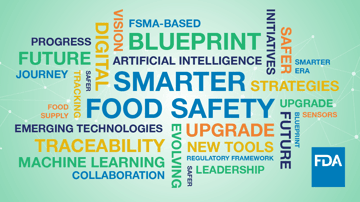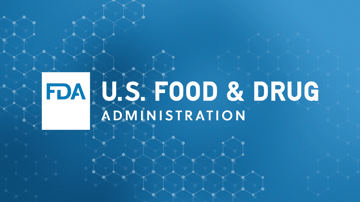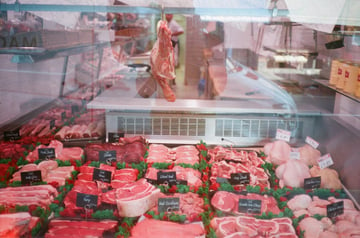In October 2021, the FDA held the New Era of Smarter Food Safety Summit on E-Commerce: Ensuring the Safety of Foods Ordered Online and Delivered Directly to Consumers. This summit featured a series of meetings geared towards helping the agency better comprehend how human and animal foods are sold via B2C e-commerce mediums across the United States. The latter is especially important considering the growing number of consumers who have turned to online food ordering, in addition to expanding and adaptive business models. Additionally, the recently held summit comprises a goal set forth within the New Era of Smarter Food Safety blueprint.
The period for public comments on the summit recently closed, marking a deadline for organizations and businesses to provide feedback and guidance on these public meetings. FoodLogiQ appreciates the opportunity to submit comments to the Food and Drug Administration, HHS in response to the Agency’s Federal Register notice regarding “New Era of Smarter Food Safety Summit on E-Commerce; Public Meeting; Request for Comments." Read an abridged version of FoodLogiQ's comments on the public meetings, below.
FoodLogiQ supports some of the largest foodservice operators, food manufacturers and grocers in the world. This provides us with a unique perspective regarding today’s challenges and future opportunities facing food industry partners when implementing supply chain visibility and food safety programs.
Core Element 3.1 of the New Era of Smarter Food Safety Blueprint outlines the need to “Ensure Safety of Food Produced or Delivered Using New Business Models”. We applaud the FDA for holding an online summit with industry stakeholders to discuss and identify future courses of action to address potential food safety vulnerabilities. The FDA needs to address these e-commerce challenges and other emerging routes to market to ensure that consumers are receiving foods that are safe for consumption.
Digital Approach
Implementation of this core element will require discipline from food industry trading partners to adopt solutions and technologies that will gather data and monitor product risk factors through various points of data collection - including exploring the use of temperature trackers, tamper-resistant packaging and capturing traceability event data.
Taking a new approach to the supply chain, leveraging technology and other tools to create a safer and more digital, traceable food system can be achieved. We are doing this today at FoodLogiQ with our cloud-based FoodLogiQ Connect platform, which enables supplier management through documentation and assessments, gathering transactional event data to support batch/lot and serialized traceability, and managing recalls from notification through to action, gathering site-level information regarding product retrieval and/or destruction.
To enable a transparent supply chain, companies need data. They need systems that can collect and provide visibility to the critical information to foresee and manage supply chain risks. To this end, FoodLogiQ recommends:
- Further exploration of e-commerce business models and operational practices (B2B, B2C)
- Review of current regulatory framework, and identification of gaps and challenges
- Engage e-commerce food industry in New Era and FSMA 204 public meetings and discussions
- Explore the creation of additional guidance and possible regulatory frameworks
- Enhanced food safety education across the e-commerce food sector
Standards-Enabled, Transparent Supply Chains
Technology providers will need to create viable solutions that address different companies’ capabilities, from low to high tech, exploring a range of systems from existing technologies such as EDI and barcodes, to RFID, blockchain and cloud technologies. With enhanced, technology-driven data management and automation, we can greatly increase the amount of data about the supply chain, action food safety issues quicker and with more precision, reduce food waste and build more transparency between trading partners and end consumers.
Increasingly globalized, complex supply chains have resulted in less visibility into food sourcing for customers and regulators. These trends are driving the need for digital transformation through the adoption of technology to bring automation, integrity, data management and traceability. Digital technology can enhance the ability to identify, respond to, and prevent food safety issues such as outbreaks, fluctuating market demand, and the minimization of waste, labor, or resources utilized in production.
Neither a single method for collecting all food supply chain data nor a single repository for holding and sharing such information is feasible. Interoperability is necessary (though not sufficient) to create a traceable food supply chain. By establishing baseline requirements, each supply chain participant should be able to collect and share the same information (e.g. unique identifier, lot, batch, etc.) regardless of their technology choice.
Without interoperability, a vast amount of critical food supply chain data remains in silos, preventing a visible supply chain. Additionally, the producers and growers at the beginning of the food supply chain tend to be small businesses, particularly as compared to the large distributors and retailers participating further down the line. Often, these smaller participants are asked to comply with multiple transparency and traceability requirements, which can be burdensome to meet. Industry collaboration driven by interoperable standards is necessary to lower the technological, financial and resource barriers to adoption and participation, particularly for smaller companies. Standardization will also reduce the need for customization, allowing for more seamless and scalable onboarding processes for participants deploying transparency and traceability solutions.
To help demonstrate the scalability that can result from harmonized standards, the FDA can take certain actions, such as conducting pilots with supply chain members and technology partners.
Once standards are in place to ensure physical and digital identities are being utilized to tie universal baseline content to each end-consumption item, FDA should mandate the capture of such content at each critical event in the supply chain where the product either changes states or owners. To ensure actionable transparency, FDA must move beyond the one-step-forward, one-step-back approach to ensure that baseline content is captured from end-to-end, or farm-to-fork.
Missing information resulting from non-participation can cause dangerous delays in responding to food safety incidents and limit the ability of participating stakeholders to fully capture the benefits of supply chain transparency. Any traceability requirements should facilitate the use of technology to electronically and easily capture and share the required information. As food supply chains become more globalized and complex, paper (and non-automated) records have become increasingly inadequate tools for tracking supply chain data.
Supply Chain Examples
- Whole Foods Market: As the coronavirus pandemic began to spread in 2020, Whole Foods Market actively engaged FoodLogiQ to support their COVID-19 efforts. They worked with FoodLogiQ to support heightened food safety procedures being implemented in their stores and distribution centers. Whole Foods leveraged FoodLogiQ Connect to begin daily inspections in all stores by monitoring enhanced cleaning and sanitation. This use of the platform enabled their stores and distribution centers to provide notifications and reports on their COVID-19 responses through tracking of the enhanced cleaning procedures.
- Tyson Foods: Tyson’s pragmatic approach to leveraging standardized data attributes and data exchange scenarios helps the company conduct business with the velocity today’s industry landscape demands. Tyson continues to further leverage its investments in implementing GS1 Standards, particularly GS1-128 barcodes, for case-level traceability to help enable stability and reliability for a variety of business processes.
Summary
As we move forward, companies need to adopt technology that offers visibility and transparency where it’s needed most. They need tools to communicate across supply chains that promote food safety and prevent disruptions.
Resilient supply chains must focus on the adoption of technology to bring automation, integrity and data management solutions to supply chain traceability. The role of government in this arena is to facilitate the use of technology and establish standards that allow for new technologies to work together seamlessly.
Digital technology can help build trusted, resilient and secure supply chains to address the needs of the 21st century. FoodLogiQ would like to thank the FDA for its consideration of our comments. We look forward to participating in the work ahead with the industry to achieve the vision of more efficient and resilient supply chains.
Read FoodLogiQ's full "New Era of Smarter Food Safety Summit on E-Commerce" commentary on the Federal Register here.
Other posts you might be interested in
View All Posts
Food Safety
5 min read
| December 18, 2019
A New Era of Smarter Food Safety Public Comments
Read More
Traceability
10 min read
| February 25, 2021
FoodLogiQ Commentary on the FDA's FSMA 204 Proposed Rule
Read More
Traceability
11 min read
| July 8, 2021

